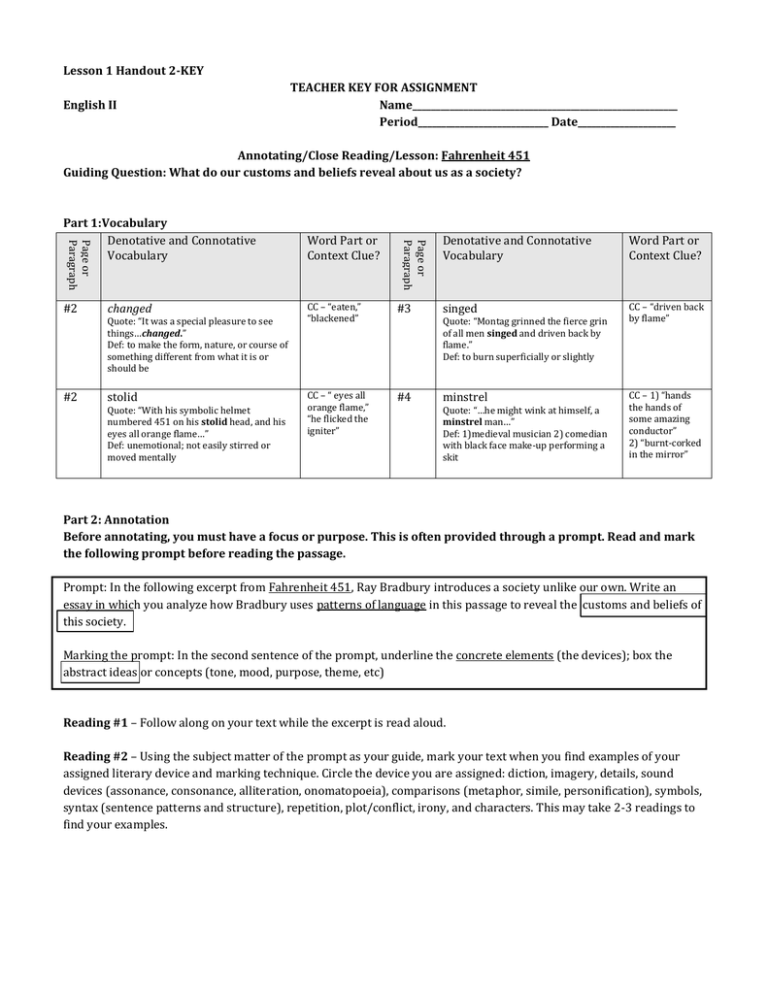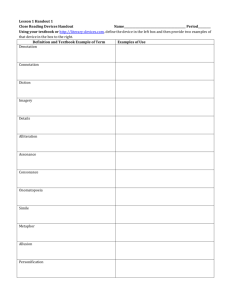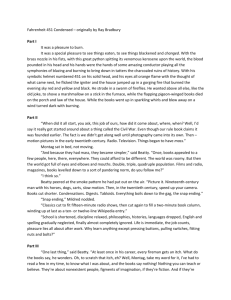Lesson answer key handout
advertisement

Lesson 1 Handout 2-KEY
English II
TEACHER KEY FOR ASSIGNMENT
Name_________________________________________________________
Period____________________________ Date_____________________
Annotating/Close Reading/Lesson: Fahrenheit 451
Guiding Question: What do our customs and beliefs reveal about us as a society?
Word Part or
Context Clue?
Page or
Paragraph
Page or
Paragraph
Part 1:Vocabulary
Denotative and Connotative
Vocabulary
Denotative and Connotative
Vocabulary
Word Part or
Context Clue?
#2
changed
CC – “eaten,”
“blackened”
#3
singed
CC – “driven back
by flame”
#2
stolid
CC – “ eyes all
orange flame,”
“he flicked the
igniter”
#4
minstrel
CC – 1) “hands
the hands of
some amazing
conductor”
2) “burnt-corked
in the mirror”
Quote: “It was a special pleasure to see
things…changed.”
Def: to make the form, nature, or course of
something different from what it is or
should be
Quote: “With his symbolic helmet
numbered 451 on his stolid head, and his
eyes all orange flame…”
Def: unemotional; not easily stirred or
moved mentally
Quote: “Montag grinned the fierce grin
of all men singed and driven back by
flame.”
Def: to burn superficially or slightly
Quote: “…he might wink at himself, a
minstrel man…”
Def: 1)medieval musician 2) comedian
with black face make-up performing a
skit
Part 2: Annotation
Before annotating, you must have a focus or purpose. This is often provided through a prompt. Read and mark
the following prompt before reading the passage.
Prompt: In the following excerpt from Fahrenheit 451, Ray Bradbury introduces a society unlike our own. Write an
essay in which you analyze how Bradbury uses patterns of language in this passage to reveal the customs and beliefs of
this society.
Marking the prompt: In the second sentence of the prompt, underline the concrete elements (the devices); box the
abstract ideas or concepts (tone, mood, purpose, theme, etc)
Reading #1 – Follow along on your text while the excerpt is read aloud.
Reading #2 – Using the subject matter of the prompt as your guide, mark your text when you find examples of your
assigned literary device and marking technique. Circle the device you are assigned: diction, imagery, details, sound
devices (assonance, consonance, alliteration, onomatopoeia), comparisons (metaphor, simile, personification), symbols,
syntax (sentence patterns and structure), repetition, plot/conflict, irony, and characters. This may take 2-3 readings to
find your examples.
Part 3: Guided Reading Notes –the key offers suggestions as evidence but is not limited to what is provided
After you have annotated your paper, discuss among the other students who were also assigned your device what pattern that
particular device reveals about the customs and beliefs of this society. Come to a consensus and then write your insight in the chart
below. Aim for three entries per device unless directed otherwise. Groups will then share their findings with the class.
Device
Evidence
Insight into the customs and beliefs of society
Diction
Word choice;
1-2 words
each; group
in 3s
“burn,” “blackened,” “kerosene,” “tatters,” “charcoal ruins,” “orange flame,” “igniter,”
“fire,” “red,” “yellow,” “black,” “furnace,” “died,” “dark,” “singed,” “fiery smile,”
This list of fire and burning words reveals that this society thrives on fire and the use of it as
a means of destruction is commonplace.
“stolid”
Stolid means “unemotional; not easily stirred mentally.” This reveals that the firemen are so
accustomed to such acts of violence, that it doesn’t affect them any longer. It also shows the
level of brainwashing that has taken place for a fireman not to question the act of burning
rather than saving.
“minstrel”
“It was a special pleasure to see things eaten, to see things blackened and changed.”
Imagery
5 senses: see,
hear, taste,
smell, touch
Details
Facts,
observations,
incidents
which impart
voice
*Sound
“bring down the tatters and charcoal ruins of history”
“gorging fire that burned the evening sky red and yellow and black”
“It was a pleasure to burn.”
This statement sums up the feelings of the firemen; they enjoy the destruction they cause.
The reader doesn’t understand why at this point, but it is glaringly obvious from the first
sentence that this society is quite different from our own.
“It never went away, that smile, it never ever went away, as long as he remembered.”
In this first short passage, the reader can infer that the firemen of this society have been so
brainwashed that they take great pleasure from causing the destruction that comes with
their job.
These harsh and noisy words represent the sounds and actions heard at the large fire; the
fireman is enjoying the destruction.
Onomatopoeia – “spitting,” “flicked,” “flapping,” “blazing”
Alliteration,
assonance,
consonance,
onomatopoeia
Consonance – “the brass nozzle in his fists, with this great python spitting its
venomous kerosene upon the world”
(CompariSons)
Metaphor – hose to a “great python”; kerosene to “venomous kerosene”; fireman’s
hands to “hands of some amazing conductor”; books to “tatters and charcoal ruins of
history”; eyes to “orange flame”; ashes of books to “swarm of fireflies”; books to
“pigeon-winged books”
Simile,
metaphor,
personification, allusion
Symbols
Personification – “house jumped up”; “books died”
“451”
“books”
{Syntax}
Author’s
style,
sentence
structure,
voice
√Repetition
of words,
phrases,
sentences
Plot/
Conflict
∼∼∼∼∼
1
Example
Irony
!
A minstrel is a “medieval musician or a black face make-up comedian who performs a skit.”
The relates to Montag on two levels. First, he is metaphorically described as a conductor
destroying history by fire. Just as the Middle Ages is also known as the Dark Ages for its lack
and destruction of knowledge, it is appropriate that Montag would be compared to such. He
is also playing out a role for the government, so in that vein, he is performing a skit. He is
also covered in soot, giving him a black face as if he has been painted.
These images reveal that this society is brainwashed into believing that knowledge is
dangerous and must be destroyed. It is obvious that this ideology has been practiced for
some time for the firemen to not only accept this as correct, but to also derive pleasure from
it. The reader also realizes that this society’s government must fear the knowledge to be
found in books, as it compares burning books to destroying history.
firemen
“changed”
“It was a pleasure to burn.”
2nd Sentence of 2nd Paragraph “With the brass nozzle…ruins of history.”
The “s” sound being repeated in these words represents the metaphorical python’s hissing
as it destroys what it sprays its venom on.
These metaphors and personification jointly portray this society as one which thrives on the
destruction of knowledge. Here, knowledge learned throughout the course of history is
referred to as “tatters” and “ruins” to prove that keeping the population in darkness and
ignorance through the use of fear is the goal. From the outset of the novel, the reader can
infer that society is led by a totalitarian government.
These three symbols tie together in that the firemen symbolize the destruction of
knowledge (symbolized by the books) and this destruction takes place at a certain
Fahrenheit – 451 degrees.
The author brings significance to the word “changed” by italicizing it. “Changed” means to
make the form, nature, or course of something different from what it is or should be. In this
context, society has been changed for the worse as it thrives on seeing things “blackened”
or “eaten.”
This simple sentence is also passive voice and 3 rd Person Omniscient. The sentence is
general and then moves to the specific in the passage. It simply states that the firemen
derive pleasure from destruction. Just as there is no further explanation needed in his mind,
there are also no further questions about why he must do such things. Being written in
passive voice and 3rd person creates a sense of detachment between both the fireman and
his prey and the reader and the fireman. Their indoctrination into this belief system
prevents further probing by the reader.
“pleasure,” “pleasure”
“grinned,” “grin,” “smile,” “smile”
This is a periodic sentence in which the parallel phrases and clauses at the beginning of the
sentence build to the main independent clause at the end. This structure mimics the
movements of the “python” as it writhes to bring down “history.”
These repeated words embody the mindless firemen who routinely destroy without
question and take pleasure from inflicting pain on those who oppose their government.
“went away,” “went away”
“It was a pleasure to see things burn. It was a special pleasure to see things eaten, to
see things blackened and changed.”
The first two sentences portray this society as sadistic where those in power enjoy inflicting
pain and destruction upon those who vary from the expected norm.
“brass nozzle…spitting its venomous kerosene”
One would expect a fireman to smile about saving something from a fire, not from using
kerosene in his hose to destroy it. The fact that he is drawing pleasure from watching things
die reveals how corrupted this society is.
“He wanted…to shove a marshmallow on a stick…while the …books died”
“going to sleep, he would feel the fiery smile still gripped by his face muscles”
[Characterization]
“He wanted…to shove a marshmallow on a stick…while the …books died”
“Montag grinned the fierce grin of all men singed and driven back by flame.”
“going to sleep, he would feel the fiery smile still gripped by his face muscles”
Montag represents the brainwashed segment of this totalitarian society. He not only
performs his actions out of duty, but also out of pleasure. It pleases him to destroy what he
does not value.
SUMMATIVE ASSESSMENT ANSWER KEY
1. ad
2. bd
3. e
4. ae
5. b
6. bd
7. a
8. d
9. be
10. ac
11. b
12. c
13. a
14. c
15. a





